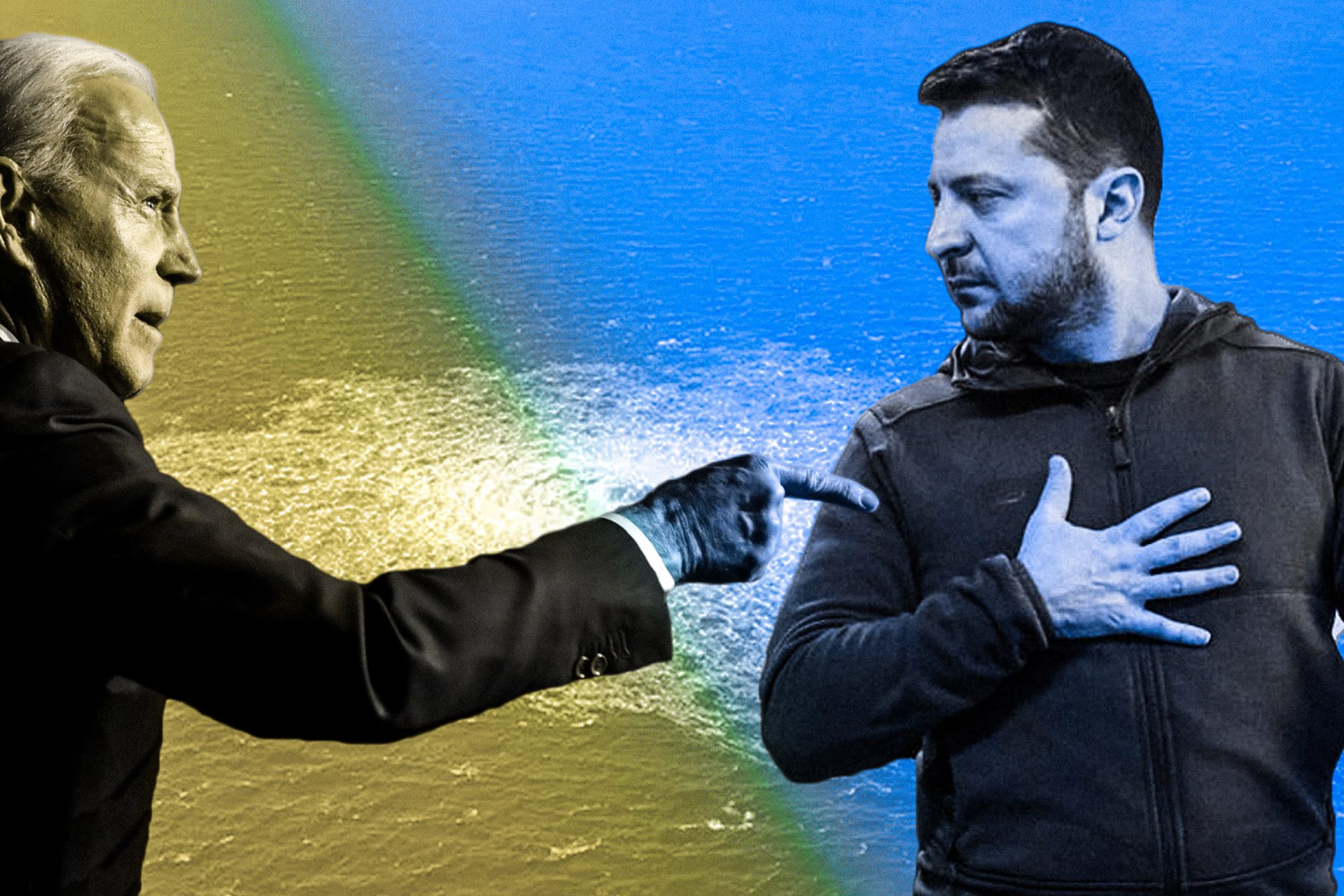
The plot thickens! A month after acclaimed American journalist Seymour Hersh released a bombshell report, accusing the CIA of masterminding the bombing of the Nord Stream gas pipelines between Russia and Germany last year, two articles simultaneously appeared in major U.S. and German news publications linking Ukraine to the attack. Not only that, but they claim western secret services knew all along! What are we to make of this?
Up until now, in the west we have repeatedly been informed (as part of a torrent of war propaganda) that Russia committed the attack on Nord Stream.
But in an incredible about face, two major mouthpieces of the US and German ruling class—i.e., Ukraine’s most important military and political allies—allude to “new intelligence” that suggests the attack was orchestrated by an ill-defined “pro-Ukrainian” outfit.
Kyiv was quick to deny any part in the bombing, which constitutes nothing short of a terrorist attack and war crime on civilian infrastructure that condemned countless households in Europe to energy poverty.
Endless lies have poured out of the western media during this war, like gas into the Baltic sea. Accordingly, we should treat these new articles with deep suspicion. In no small part because they are full of holes, vagaries and contradictions. But why this change in the narrative, and why now?
‘Thank you, U.S.A.’
When news broke of explosions irreparably damaging the Nord Stream 1 and 2 pipelines in September 2022, Kyiv wasted no time in blaming Russia.
Mykhailo Podolyak, adviser to president Volodymyr Zelenskyy, tweeted that the: “‘gas leak’ from NS-1 is nothing more than a terrorist attack planned by Russia and an act of aggression towards [the] E.U. Russia wants to destabilise [the] economic situation in Europe… The best response and security investment—tanks for Ukraine. Especially German ones.”
Some western commentators were more circumspect, saying that it was “unclear” who was behind this act of sabotage, though most strongly hinted at Russian responsibility, with E.U. foreign policy chief Josep Borrell warning of “a robust and united response” to “any deliberate disruption of European energy infrastructure”.
Others outright pointed the finger at the Kremlin, with Polish Prime Minister Mateusz Morawiecki calling the damage to Nord Stream “an act of sabotage related to the next step of escalation of the situation in Ukraine.”
Poland’s Deputy Foreign Minister added: “Sadly our eastern partner is constantly pursuing an aggressive political course… If it is capable of an aggressive military course in Ukraine, then it’s apparent that acts of provocations in western Europe also cannot be ruled out.”
Similarly, Gerhard Schindler, the former head of Germany’s federal intelligence agency said in an interview with Welt that “only Russia can really be considered [responsible], especially since it stands to gain the most from this act of sabotage” [our emphasis].
In fact, Russia had nothing to gain from the attack, and much to lose. Its state energy company (Gazprom) was the majority owner of the pipelines; it would need to shoulder the cost of repairs; and the ability to control cheap energy supplies to Europe was an important lever against Ukraine’s western allies.
Russia strenuously denied its involvement, and in the months since, not a shred of evidence has come to light suggesting it had a hand in the attack.
Moreover, Germany (where Nord Stream makes landfall) was frozen out of a joint investigation conducted by Sweden and Denmark, in whose exclusive economic zones the blast occurred, instead conducting an independent inquiry.
Then, on Feb. 8, Hersh released a post on Substack, which cited an anonymous source “with direct knowledge of operational planning”, to accuse the USA of masterminding the bombing.
He says the US cooperated with Norway to plant explosives on the underwater pipelines, under cover of a planned NATO naval exercise in June 2022, then detonated them remotely in September. His report goes into some detail about how the operation was organized, who authorized it, and who carried it out.
Washington dismissed Hersh’s claims as “preposterous” and “a function of Russian disinformation”, mocking his reliance on a single anonymous source. His story (which no major publication would touch, as evidenced by its appearance on a free blog platform) received minimal coverage in the mainstream press.
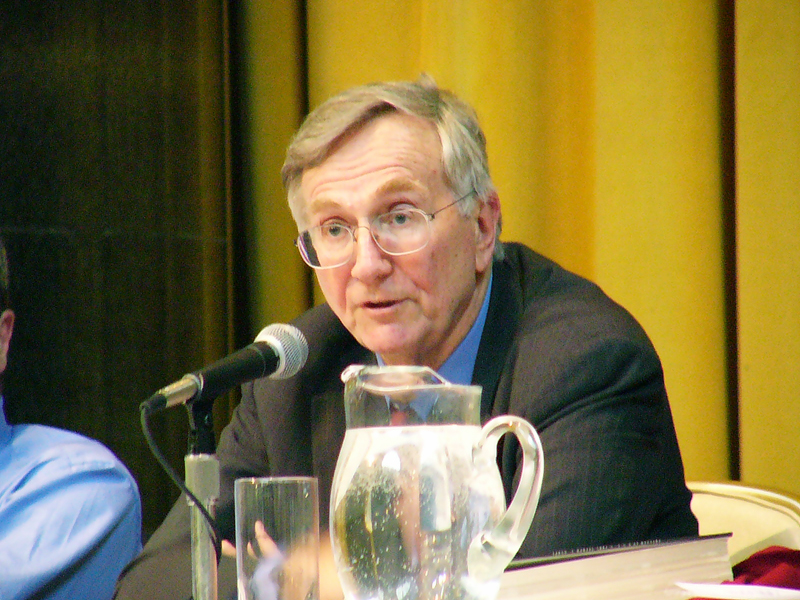
Source: Marjorie Lipan, Flickr
However, it was impossible to ignore Hersh’s point that, in contrast to illogical claims of Russian responsibility, the U.S. and Ukraine stood to benefit from the sabotage.
The U.S. had made no secret of always opposing Nord Stream, which was seen as making Europe dependent on Russia’s energy supplies, and bringing it closer to the Kremlin’s sphere of political influence.
Meanwhile, its destruction made the continent more reliant on more expensive American LNG (Liquefied Natural Gas). It also prevented Ukraine’s European allies (particularly Germany) from seeking an early peace deal with Russia in exchange for the gas taps being turned back on, with both the U.S. and Ukraine keen to keep fighting.
U.S. President Joe Biden even stated at a press conference in February 2022 that “If Russia invades… there will be no longer a Nord Stream 2. We will bring an end to it.”
The likelihood of US involvement was clearly not lost on Polish Foreign Minister Radoslaw Sikorski, who tweeted a picture of gas rising from the destroyed Nord Stream pipelines on the day of the attack, with the caption: “Thank you, U.S.A.”.
Shifting the blame
Despite dismissing or ignoring Hersh’s account in public, it is doubtless that many politicians in the west read it closely, especially those in Berlin.
After all, Germany was the biggest loser from Nord Stream’s destruction, and its population endured rocketing energy bills in “solidarity” with Ukraine even before the sabotage. Any hint of involvement by its alleged allies in Washington would be an absolute outrage.
Meanwhile, the German Attorney General’s office has been conducting an independent investigation into the bombing for several months. Who knows what they have turned up?
On Friday, Mar. 3 German Chancellor Olaf Scholz met Biden for a top secret war summit. There has been speculation about what they discussed, but the level of secrecy of the meeting (at which no members of staff were allowed) is significant, as is the fact that at the post-meeting public statement, journalists were not allowed to ask questions.
Days later, on Mar. 7, simultaneous articles appeared in The New York Times and Die Zeit commenting on “new evidence” of Ukrainian involvement.
We have no way of knowing what Biden and Scholz discussed, but the timing and synchronized release of these articles—clearly following a briefing by the U.S. and German government—is very striking.
We note that the New York Times article also relies entirely on anonymous sources: presumably fed to them by Washington. This is very ironic, given how Hersh’s account was dismissed by many ‘serious commentators’ as a ‘conspiracy theory’ for not naming his source.
The report states that “new intelligence reviewed by U.S. officials suggests that a pro-Ukrainian group carried out the attack on the Nord Stream pipelines last year.”
It does not elaborate on what this intelligence is, and is careful to note that there is “no evidence President Volodymyr Zelensky of Ukraine or his top lieutenants were involved in the operation, or that the perpetrators were acting at the direction of any Ukrainian government officials.”
The new intelligence suggests the perpetrators were “most likely Ukrainian or Russian nationals” and “opponents of President Vladimir V. Putin”, but “it does not specify the members of the group, or who directed or paid for the operation.”
However, the cited officials are clear that “no American or British nationals were involved.” They also suggest “the operation might have been conducted off the books by a proxy force with connections to the Ukrainian government or its security services.”
So, we have Ukrainian (or Russian), anti-Putin saboteurs, possibly with “connections” to Kyiv, but not authorized by Zelensky or any top officials.
This extremely hazy profile emphasizes a few main points: the US was not responsible; and while the bombers might have been “pro-Ukrainian”, they were not officially acting under the orders of the Kyiv government.
These revelations seem more geared towards placating Washington’s allies in Europe, and shifting the blame (without blaming Ukraine outright), than anything else.
They knew all along?
The report in Die Zeit (presented as the result of a joint investigation by a number of German news sources) is more specific in its allegations, though it also omits a great deal of information.
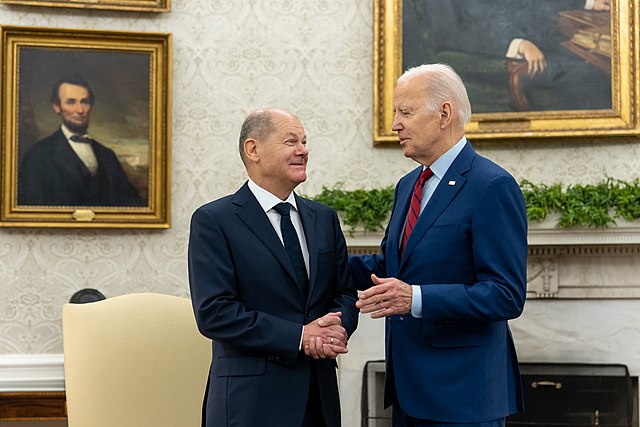
It claims that German investigators have located the vessel that was used to transport the explosives used in the bombing. It says the yacht in question was rented from a Poland-based company, owned by two Ukrainians.
It claims the operation was carried out by a crew of six people (of unknown nationality), using “professionally forged passports”, who sailed from the German port of Rostock on Sept. 6, 2022, to plant the explosives off the coast of the Danish Island Bornholm. The report claims the yacht was returned to its owner in an “uncleaned state”, with traces of explosives in its cabin.
Like the American report, Die Zeit cites new intelligence indicating that “a pro-Ukrainian group could be responsible”, and attributes the “destruction” of Nord Stream 1 and 2 to a “Ukrainian commando”. It adds that “investigators have not yet found any evidence as to who ordered the destruction.”
The article also suggests that the whole thing could be a Russian “false-flag operation”, stating “traces could also have been deliberately laid that point to Ukraine as the culprit.” Though it admits “investigators have apparently found no evidence that confirms such a scenario.”
But the most explosive allegation of all is that “a Western secret service is said to have sent a tip to European partner services in the autumn, i.e. shortly after the destruction.”
This makes the claim of a “false flag” totally nonsensical. Why would European secret services receive a tip from the perpetrators from a Russian false-flag operation?
If true, what this article amounts to is an admission that, despite their public accusations against Russia, governments in Europe had intelligence pointing in the opposite direction all along. But, why let the facts get in the way of a good story, as they say.
This line is echoed by an article in the Times, published on Mar. 8 by a journalist based in Kyiv, titled: ‘West kept quiet about Nord Stream attack to protect Ukraine’.
It states:
“A week after the Nord Stream pipeline exploded, staff at a Scandinavian delegation in Brussels walked out of their embassy intelligence briefing, impressed by the level of detail they had received so soon after the attack.
“It hadn’t been carried out by the Americans, the Russians or the Poles, their intelligence service apparently told them, but by a private venture originating in Ukraine [our emphasis]. They were told this would not be made public and to deflect any questions about why the official investigation into the destruction of the Russo-German pipeline was moving so slowly.
“The name of the suspected private sponsor, a Ukrainian not affiliated with President Zelensky’s government, has been circulating in intelligence circles for months but not revealed.”
Another Times article, published on the same day, attributes the sabotage to a “small ‘pro-Ukrainian’ cell… a tight-knit private group opposed to the Putin regime but acting independently of the Ukrainian government.”
So we have a mysterious Ukrainian commando, and a secretive pro-Ukrainian cell, operating independently of the Kyiv government, in contact with Western secret services, under the orders of persons unknown, to sabotage Nord Stream.
The first question here is: how did a non-state organization conduct such a sophisticated sabotage operation, using hundreds of kilos of specialized explosives on pipelines hundreds of metres below sea level, in heavily patrolled waters, without anybody noticing?
We can only agree with the assessment of August Hanning, who headed the BND (German Federal Intelligence Service) from 1998 to 2005, who said in September last year:
“This operation was obviously carried out in such a professional and complex manner that only well-trained special forces could be considered for its execution.”
The reports in Die Zeit and The Times state that Western state agencies knew about the attack immediately after it happened. We wonder if Borrell will make good on his promise of “a robust and united response” to “any deliberate disruption of European energy infrastructure”!
Means and motive
Does any of this add up? All the convoluted and conflicting information makes it impossible to be absolutely sure of what transpired last year. But we can make some educated inferences.
Clearly, this bombing could only have been conducted with the support of one state or another. German and Swedish officials said as much at the time, with the latter commenting in September 2022:
“It is very likely that the act is deliberate and that it is not an accident and it is very unlikely that it was done by someone other than a state without being detected first.”
So which state was behind the bombing? Despite their attempts to wash their hands of the attack, the U.S.A. still had the best means and motive.
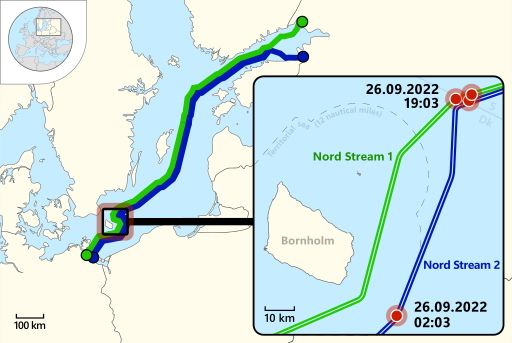
As a Russian official commented wryly in Global Affairs: “Strictly speaking, the U.S. administration falls under [the] definition” of a “pro-Ukrainian group.”
It is very unlikely that these reports would have come out in the absence of the awkward questions raised by Seymour Hersh. But if the U.S. was behind the attack, why throw Ukraine under the bus?
Some clues exist in the New York Times article (which we can read in the voice of the State Department).
It notes that “any findings that put blame on Kyiv or Ukrainian proxies could prompt a backlash in Europe and make it harder for the West to maintain a united front in support of Ukraine” (our emphasis).
This is a not-so-veiled threat to Kyiv. But why? Later, the article says:
“Despite Ukraine’s deep dependence on the United States for military, intelligence and diplomatic support, Ukrainian officials are not always transparent with their American counterparts about their military operations, especially those against Russian targets behind enemy lines. Those operations have frustrated U.S. officials, who believe that they have not measurably improved Ukraine’s position on the battlefield, but have risked alienating European allies and widening the war” [our emphasis].
These operations include: “a strike in early August on Russia’s Saki Air Base on the western coast of Crimea, a truck bombing in October that destroyed part of the Kerch Strait Bridge, which links Russia to Crimea, and drone strikes in December aimed at Russian military bases in Ryazan and Engels, about 300 miles beyond the Ukrainian border [and]… a car bomb near Moscow in August that killed Daria Dugina, the daughter of a prominent Russian nationalist.”
In other words, the message from the U.S. ruling class to Zelensky is: “stop acting out of turn to provoke Russia and escalate this war, or your western support will dry up.”
Small nations: Small change
Despite the endless chorus of propaganda from the west of Russia’s imminent defeat, and total support for Ukraine to regain all of its lost territory, the situation behind the scenes is very different.
In this conflict, which is in reality a proxy war between NATO and Russia on Ukrainian soil, U.S. imperialism calls the shots. It wants to undermine Russia and bring Europe back into the fold, but it doesn’t want things to get out of hand.
It also has a sober appraisal of Ukraine’s actual military situation. Despite Kyiv’s triumphant claims of its continued success on the battlefield, its forces are currently on the brink of defeat in the eastern town of Bakhmut, which has become a focal point of the war and seen months of bloody attritional combat.
Ukraine has variously dismissed Bakhmut’s importance as merely “symbolic”, while Zelensky has also warned that its fall would give Russian an “open door” to take the whole of the Donbas. NATO Secretary General Jens Stoltenberg also admitted on Mar. 8 that the town might soon fall (while also downplaying its importance).
In any case, the serious military analysts in the U.S. understand that total victory for Ukraine (i.e. the recovery of all disputed territory, including Crimea) is far-fetched, and would also pose the risk of escalation to a direct clash between NATO and Russia.
This was put in black-and-white by the RAND Corporation, a libertarian think tank that essentially represents the unvarnished perspective of the US military industrial complex.
In a report titled “Avoiding a Long War U.S. Policy and the Trajectory of the Russia-Ukraine Conflict”, it bluntly states that an outright Ukrainian victory is very unlikely, and the risk of escalation resulting from a long war is not in America’s interests. It should therefore be avoided, even if that means Ukraine losing territory.
It even suggests that Russia should be enticed to negotiations with the promise of sanctions relief in exchange for a ceasefire. This reflects the thinking of the most cynical and dispassionate wing of the American ruling class.
Zelensky, for his part, would be all-too happy for NATO to become directly involved in the conflict, and has progressively demanded more and more weapons, capable of striking deeper into Russian-held territory—most recently, he has his eyes set on fighter jets.
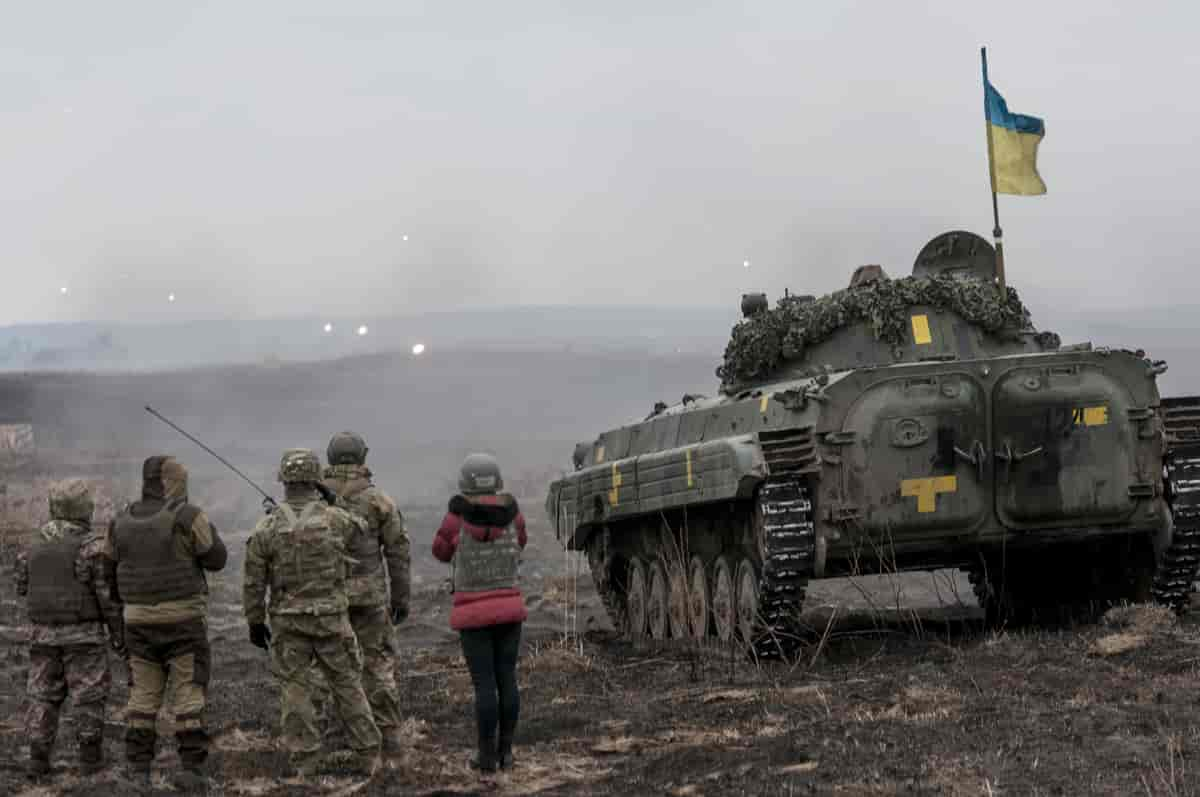
So far, the U.S. has been very careful to give Ukraine just enough arms to avoid total defeat, but not enough to risk a direct confrontation between Russia and NATO.
Now, it seems to be pinning the Nord Stream bombing on Ukraine (albeit, without directly accusing Kyiv). This serves the dual purpose of denying American responsibility, in favour of a patsy in no position to complain, while also putting Ukraine back in its place.
The convoluted concoction of half-truths, outright lies, and vague accusations over Nord Stream should prove beyond any shadow of doubt that not a single syllable uttered by western imperialism or its prostitute press can be taken at face value.
Whatever exact course of events led to the pipelines’ destruction, we can say with confidence that the west was involved, lied about it, and is now trying to deflect blame. Meanwhile, U.S. imperialism is demonstrating the truism that small nations are nothing but small change in the hands of the big world powers.
The U.S. was instrumental in provoking this war, and is dragging it out for as long as this suits its interests. As Senator Mitt Romney recently tweeted:
“Putin’s Russia is not our friend and it is China’s most powerful ally. Supporting Ukraine weakens an adversary, enhances our national security advantage, and requires no shedding of American blood” [our emphasis].
U.S. imperialism is happy to spend an ocean of Ukrainian blood to pursue its war aims, and would not hesitate for a moment to betray Ukraine if it became expedient to do so. Nor would it bat an eye about committing a war crime against ostensible allies to achieve its objectives.
Whether the full truth about Nord Stream is ever settled, it is impossible to fully conceal the stench arising from the rotten games of the warmongering capitalists.

